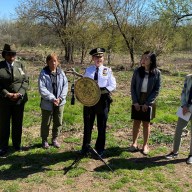John F. Kennedy Airport is a city under siege this week as international tensions rose to a fever pitch amid charges that anti-terrorist precautions at individual airlines were sorely lacking.
John Clabby, president of Corporate Loss Prevention Associates of Long Island City, who is an anti-terrorist consultant to five airlines at Kennedy, described the airport as "vulnerable to terrorist activities."
He placed the blame on the laxity of some security supervisors who aren’t adequately enforcing protocols.
A spokesperson for the Port Authority, which operates JFK, acknowledged that security lapses occur at individual airlines at Kennedy.
"It’s a case that some security personnel are good at what they do and others are less dedicated," Bill Cahill, the spokesperson, said.
He said that since the TWA Flight 800 disaster the Port Authority had "stuck its nose into the security operations of the individual airlines."
Clabby gave a Queens Courier reporter and photographer unusual access to security precautions taken by Korean Airlines and Nippon Airlines. He said they were among the most effective security-conscious airlines based at Kennedy.
Security was described as "a high priority" at the airport as the result of two recent developments:
o The U.S. threat to bomb Iraq because of Saddam Hussein’s failure to permit a U.N. team access to weapon sites.
o The arrest of two men in Las Vegas for possession of anthrax and maps of New York City’s subway system.
Last week Cong. Charles Schumer of Queens, co-author of the 1996 anti-terrorism law, charged that New York City is "woefully unprepared if targeted by a biological or chemical attack."
He clashed with Mayor Giuliani who believes that New York is better prepared than most cities.
The mayor called Schumer’s remarks "irresponsible" election-year scare tactics."
Clabby is security consultant to five airlines including Korean Airlines, Nippon Airlines, Saudi Air, Asiana and American Airlines. It also provides security support for the U.S. Tennis Stadium at Flushing Meadows and Shea Stadium. In the aftermath of the 1996 Olympic bombing in Atlanta, security was significantly beefed up at the U.S. Open, a huge international event. Bags were individually inspected at the entrance gates.
"Right now there is a tremendous threat facing New York City," Clabby said. "Terrorists know that an attack on a New York City institution will give their message impact."
He estimated that the JFK’s 40,000-member security force — uniformed and undercover — are supported by approximately 50,000 cameras.
Port Authority Bolsters
Airport Security Measures
A 10-point program to enhance security at Kennedy,LaGuardia and Newark airports has been in effect since the TWAFlight 800 disaster.
The 10 points include:
• Expand current Port Authority security auditing at all three airports, using outside specialists to test security throughout the airport — including areas controlled by airlines and other tenants.
• Establish teams of explosives-detecting dogs.
• Begin a "Three strikes, you’re out"program for frequent violators of airport security procedures.
• Install new physical security measures.
• Require all airline contractor personnel involved in security to obtain Port Authority-issued identification cards. Screening personnel will receive — as a minimum — a 10-year employment history check.
• Accelerate to quarterly the annual review by Port Authority Police of the 24-point cargo security program with each cargo tenant and airline.
• Require Port Authority ID for contractor construction personnel in aeronautical areas.
• Advocate stricter minimum training and qualification standards for airline security personnel, and provide refresher training in security for all airport staff.
• Increase the frequency and level of airport-wide security meetings, which include representatives of airlines, service contractors, cargo handlers and all other members of the airport community.
• Accelerate Port Authority involvement in research and development of technology-based security measures. This will keep the agency on the leading edge of technology. Clabby acknowledged that it was the era of "Big Brother" at Kennedy.
"But these are stressful times at the airport," he said. "The biggest need is for the airlines to do a better job of challenging security personnel to enforce procedures that are in general good."
Clabby said that teams of Port of Authority and F.A.A. counter-terrorist inspectors daily try to penetrate airline security.
"And almost daily," he said, "fines are levied against airlines for sloppy security procedures."
He said that one serious problem involves unattended baggage left in airline terminals.
The Long Island City firm has 140 uniformed and undercover representatives protecting its clients at Kennedy. It has installed more than 1,000 cameras in both passenger and baggage areas of the five airlines.
"The task of protecting Kennedy and other facilities located in Queens is more challenging," Clabby said, "because of the ethnic mix in the borough and the numbers of individuals from the Middle East and elsewhere who live here."
Clabby, who founded his security firm in 1980, was a member of the New York City Police Dept. He was later promoted to detective and assigned to the New York County District Attorney’s office.
He participated in the Desert Storm operation in the Persian Gulf where he led an anti-terrorism task force.
According to another airline official, Toivo Aroksaar, deputy general manager of cargo operations for Korean Air, Kennedy has a negative image because of past organized crime operations.
"The airport has a black eye because of that but today the picture is vastly different."
Korean Air’s air cargo security staff puts in an average of 1,400 hours a week with salaries of $17,000 a week paid to protect the building .
As tensions increase," Aroksaar said, "we redouble our resolve."
He noted that trucks are not permitted to park near the perimeter of the facility to prevent explosives from damaging the cargo area.
The airline also prohibits freelance air couriers hired by air cargo firms from carrying packages aboard Korean Air planes.
"We don’t know where these packages come from and so we don’t allow them aboard."
Aroksaar is no stranger to airport crime. In 1970 when he was driving a truck at Kennedy his shipment of expensive ladies knits was hijacked.
"I was held for three hours before being released," he said. "The thief who held me was the same "wiseguy" arrested for the Lufthansa robbery and later portrayed in the film, ‘Goodfellas."
The Korean Air executive said he was urged to join the federal witness pro- tection program, but refused the offer.
He also played a key role in the 1993 "roller derby" case at Koran Air in which the FBI seized 442 pounds of heroin, second largest seizure in FBI history.
Aroksaar received a commendation from the FBI for his help in the affair.





























